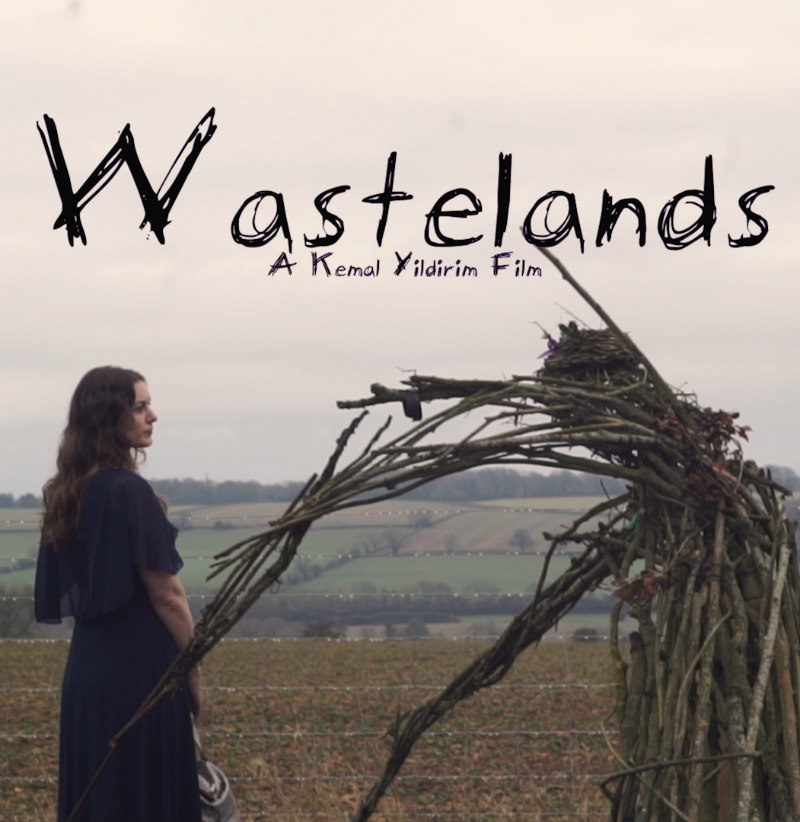
Review by Benjamin Poole
Directed by: Kemal Yildirim
Starring: Natasha Linton, Kemal Yildirim, Sean Botha, Amy Ellis, Nicola Wright

Anyone else thirsty AF at the moment? (nine weeks, two days and roughly three hours: Sinéad O’Connor has nothing on lockdown…). Alice, a lonely, damaged woman besieged by various demons of the soul certainly seems to be. When she is not working in a thankless service job at a midlands café, or lighting candles and incanting neo-pagan homilies, she is having a good old wank: recalling the sort of co-dependent, urgent sex which is hot at the time but probably not healthy for either party in the long run. Her ovaries ache at the sight of an unpleasant argument between a couple at her place of work, she recalls physical fights with her lover that turn into kitchen table shags. Alice is on the edge, an intense circumstance conveyed in the film's opening scenes, an array of everyday sequences artfully presented by auteur Kemal Yildirim (directs, stars, writes/films- with Mol Smith). We see Alice journey to work in a dialogue free arrangement of caught buses and trains, a queasily accurate portrayal of that weird imbalance of intimacy and loneliness which defines using public transport.

Yildrim’s storytelling is imaginatively cinematic from the off, his camera cutting between off-centre angles, the montage superimposing a ghostly past over present events, an iconography of blood, candles and forestry. With a forceful aestheticism, Wastelands establishes the intensity of its central player before going on to essay an unflinching character study of guilt, depression and, yes, thirst.
[ READ MORE: New Release Review - Never Rarely Sometimes Always ]

Yildrim’s storytelling is imaginatively cinematic from the off, his camera cutting between off-centre angles, the montage superimposing a ghostly past over present events, an iconography of blood, candles and forestry. With a forceful aestheticism, Wastelands establishes the intensity of its central player before going on to essay an unflinching character study of guilt, depression and, yes, thirst.
[ READ MORE: New Release Review - Never Rarely Sometimes Always ]
Alice is played by Natasha Linton (home counties Edwige Fenech), and she is utterly incredible in this emotional, physically demanding role. We follow Alice through the piecemeal plot, remembering her toxic relationship, grieving over her dead mother, coping with her critically ill father. The divide between a public face, and interior turmoil, begins to fracture. Forceful sexual longing, that carnal desire for oblivion, is the body’s unsolicited reaction to extreme circumstances: an inconvenience visually signalled by the tight tops Alice favours, which serve to highlight her nipples, which (and I know how this sounds but I am sure that this is a deliberate filmic choice) are constantly hard, staring you out from the stretched cotton of her tops. This intimate detail makes Alice uniquely vulnerable, as if her body is betraying her. Like I said, on the edge.

Although directed by a fella, it is disingenuous to say that Wastelands has a male gaze: the camera is too dispassionate and cold for that, the sexual (and they are sexual) scenes too ugly and awkward. Such a reading would also do a disservice to Linton, who is the decisive energy in this film, the camera flitting around her supressed energy as if intimidated by her impulsive sexuality.
[ READ MORE: New Release Review - The County ]

Although directed by a fella, it is disingenuous to say that Wastelands has a male gaze: the camera is too dispassionate and cold for that, the sexual (and they are sexual) scenes too ugly and awkward. Such a reading would also do a disservice to Linton, who is the decisive energy in this film, the camera flitting around her supressed energy as if intimidated by her impulsive sexuality.
[ READ MORE: New Release Review - The County ]
Yildrim and Smith’s style - the mosaic of angles, the uninhibited, flowing impressionism of the retelling - is commanded by Linton’s performance. In the first half of the film, the external pressures upon Alice are delectably ambiguous: the pagan stuff which may or may not be a contributing factor in her psychosis, the finer details of her bad romance, are hazily subjective. So, it is something of a shame when, in the final act we are given an exact motive for Alice’s mentality when her dad, suffering from a degenerative disease, has to move in with her. This final act is slightly too extended and is in danger of overwhelming with its airless misery, and the ongoing collocations of imagery; of food, of sex, and light and shadow; are given a literalism which is at odds with the dazzling and dark poetry of earlier.

Nonetheless, Wastelands is a powerful and unique film from an ambitious group of filmmakers. If you are in the market for a deeply felt, strikingly visual portrayal of simmering obsession then the experience of Wastelands will quench that thirst.

Nonetheless, Wastelands is a powerful and unique film from an ambitious group of filmmakers. If you are in the market for a deeply felt, strikingly visual portrayal of simmering obsession then the experience of Wastelands will quench that thirst.

A UK/ROI release has yet to be announced.
25 Movies You Just Might Get to See in Cinemas in 2020https://t.co/sdWqmwBKgs pic.twitter.com/dpC5vVOfjZ— The Movie Waffler (@themoviewaffler) May 16, 2020

